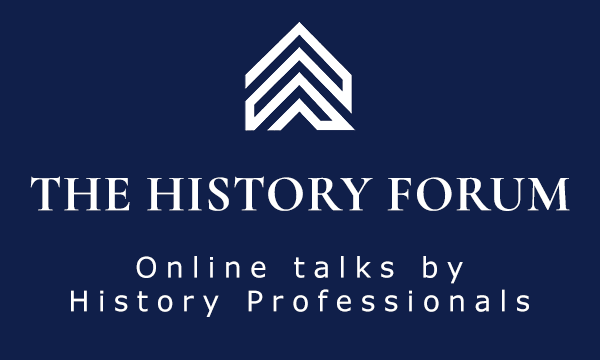
The History Forum offers online talks by professional historians covering a wide range of topics. Presenters have either published books, taught in academic institutions, or become acknowledged experts in their fields through extensive research and writing. We all have a passion to make history interesting, accessible and, where appropriate, fun.
If you cannot attend the live event, recordings will be available on request for seven days after the event.
Sign up for my newsletter to receive information and updates about The History Forum and my other work!
Welcome to The History Forum – Online Presentations by History Professionals. Join us for Series 10 (January-April 2026).
If you sign up for all 10 talks in Series 10, the cost includes a reduction (a total of £90), otherwise you can dip into individual presentations at £10 a talk.
- Recordings are available for all talks if you cannot attend the live event unless otherwise stated.
- In addition to signing up for online talks, you will receive an ON THIS DAY email giving a quick dive into a fascinating historical event.
If you cannot attend the live event, recordings are available for 7 days on request.
Pay £90 for 10 talks:
Sunday 11 January, 2026
7pm (London)
The Savage Wars of Peace: Bloody Aftermath of the Japanese Surrender 1945
GUEST SPEAKER: Lieutenant Colonel (retired) Mike Tickner
The war in Eastern Asia ended abruptly, violently and chaotically following the nuclear bombs at Hiroshima and Nagasaki. While the Imperial Japanese Army had been defeated in Burma and was losing the war in the Pacific, her army in Malaya, Hong Kong, French Indo-China, the Netherlands East Indies, Manchuria and Siam was undefeated.
Many of these countries saw the end of the war as their chance for independence and Gurkha, Indian and British troops became responsible for restoring colonial rule and became locked into open combat.
The Allies’ most pressing task was recovering their prisoners of wars and civilian internees knowing little about their condition or locations in camps across South East Asia, China and Japan. Japan’s sudden surrender created a seismic resetting of the political and social order in the region, as power vacuums were exploited for political gain and rapid decisions were made with consequences which still reverberate today.
Lieutenant Colonel Mike Tickner is a retired Regular Army officer with a long term interest in the British Army in India and particularly the Far East campaigns and the North West Frontier. He regularly gives talks to military and civilian groups, clubs and museums and writes the occasional article. He has led battlefield studies to the India and South-East Asia, most recently to Singapore.
£10 for individual talk

Sunday 18 January, 2026
7pm (London)
The Road to Redemption: Jubilees, Pilgrimages and Sacred Journeys
GUEST SPEAKER: Dr Ross King
2025 marked a Jubilee Year, a tradition with deep historical roots dating back to 1300. But what exactly is a Jubilee, and why did it inspire countless pilgrims from all over Europe to set out on arduous journeys to Rome? This lecture explores the rich history of pilgrimage, uncovering the motivations that drove medieval travellers – spiritual devotion, penance, adventure, and even social status. How did they navigate the perils of the road? What awaited them at their destinations? And how did these journeys shape the wider world? From relics and indulgences to the bustling streets of medieval Rome, join us for a fascinating look at the enduring power of pilgrimage and its cultural impact across the centuries.
Dr Ross King is the author of numerous books on Italian art and history, including Brunelleschi’s Dome and The Bookseller of Florence. His two latest books are The Shortest History of Ancient Rome (2025) and The Shortest History of Italy (2024).
£10 for individual talk
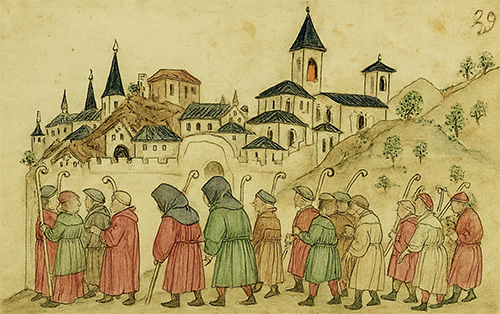
Sunday 1 February, 2026
7pm (London)
‘Little Italy’, Carlo Gatti and the Hokey Pokey Men
SPEAKER: Melanie King
Discover the extraordinary story of London’s Little Italy – a vibrant yet impoverished corner of Victorian Clerkenwell where thousands of Italian immigrants built new lives amid the city’s slums. From the clatter of ice carts to the music of barrel organs, this talk brings to life the world of Carlo Gatti, the visionary who brought ice cream and ice to the streets, and the Hokey Pokey Men, who carried his legacy through hard graft and song.
Against a backdrop of overcrowded housing and daily struggle, this close-knit community forged a rich culture of resilience, faith, and festivity that would leave an enduring mark on London’s character.
Join Melanie as we uncover the tastes, sounds, and stories of a vanished world and celebrate the people who turned hardship into heritage. Her latest book Cold Comforts: a Journey Through Ice Cream will be published in 2026.
£10 for individual talk

Sunday 8 February, 2026
7pm (London)
Miracula: Weird & Wonderful Stories from Ancient Greece & Rome
GUEST SPEAKER: Paul Chrystal
Step into the strange world of the paradoxographers – ancient collectors of the incredible, the absurd, and the downright unbelievable. Miracula brings together more than a hundred bizarre tales from Greece and Rome – funny, shocking, and rarely seen in English.
Here, Cicero gossips, Pliny gets weird, and even the most serious writers reveal their tabloid side. Think of it as Horrible Histories for grown-ups – sex, drugs, and rolling rocks included.
But beneath the laughter lie unsettling truths: cruelty, misogyny, xenophobia, and injustice that feel uncomfortably familiar. Miracula entertains, enlightens, and reminds us that the ancient world’s dark absurdities still echo today.
Paul Chrystal studied Classics at the Universities of Hull, Southampton, and the Sorbonne, Paris. After a 35-year career in medical publishing with leading firms including Wiley-Blackwell, Elsevier, and CRC Press, he turned to writing and broadcasting on history.
He has advised the National Trust in York, written for national newspapers, and appeared on BBC Radio and the BBC World Service. Since 2010, Paul has published over 120 books and articles on classical, social, and military history, as well as the cultural history of food and drink.
His recent title Miracula was published in 2025.
£10 for individual talk
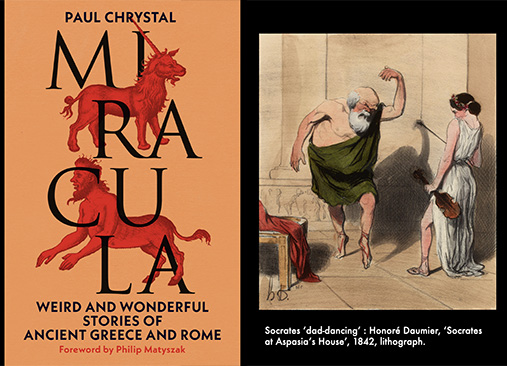
Sunday 15 February, 2026
7pm (London)
Who Wants to Sleep in a Castle? The Paradores and Pousadas of Spain and Portugal
GUEST SPEAKER: Professor David T. Gies
By the early twentieth century Spain found itself saddled with dozens (if not hundreds) of decrepit and decaying castles, monasteries and convents (the latter two having been wrested from the hands of religious orders after the 1835 expropriation by Juan Álvarez Mendizábal). The government of King Alfonso XVIII seized on the unusual idea of turning them into hotels in order to bolster tourism in the country. The first one, in the Gredos mountains, was opened in 1928; there are now 98 of them. Portugal followed suit in the 1940s.
This talk will take in the history of these gorgeous – and surprisingly affordable – buildings and provide some personal insights by the presenter.
David T. Gies, Commonwealth Professor of Spanish (Emeritus) and former Chair of the Department of Spanish, Italian and Portuguese at the University of Virginia, is one of the most distinguished voices in modern Spanish studies. He has published seventeen books and major critical editions. His scholarship also includes more than 125 essays, 145 book reviews, and lectures delivered across North America, Europe, the Middle East, and South America.
Among his many honours, one stands out: a knighthood bestowed by the King of Spain. Since retiring in 2017, David has devoted his time to leading lectures and cultural programs on Spanish and Latin American history, literature, cuisine, and culture for the University of Virginia, Smithsonian Journeys, The World, and SeaDream Yacht Club.
£10 for individual talk

Sunday 1 March, 2026
7pm (London)
Preserving Architectural Vision: The Story of Sir John Soane’s House and Legacy
GUEST SPEAKER: Dr Bill Appleton
This illustrated talk introduces the remarkable life and legacy of Sir John Soane (1753–1837), one of Britain’s most inventive architects. Rising from modest beginnings, Soane became architect to the Bank of England and a pioneer of architectural education and preservation. His lifelong project, transforming his London home into a museum of architecture, art, and antiquity, was secured for future generations through a private Act of Parliament in 1833.
This talk is ideal for audiences interested in architecture, museums, and the personal stories behind cultural preservation.
Bill Appleton, Executive Director of Sir John Soane’s Museum Foundation in New York, explores Soane’s vision, his fascination with light and illusion, and why his house museum remains one of London’s most atmospheric and influential spaces.
£10 for individual talk
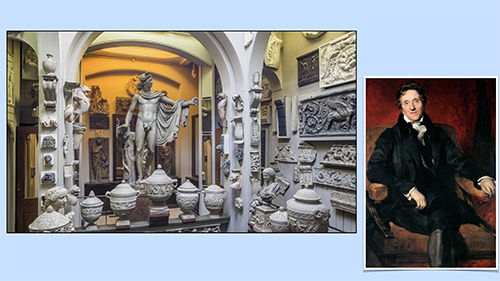
Sunday 8 March, 2026
7pm (London)
How We Fell in Love with Italian Food
GUEST SPEAKER: Dr Diego Zancani
Our culinary romance with Italy began with the Romans, who brought us garlic, onions, cherries, and chestnuts. Centuries later, pasta appeared – dried in Sicily around 900 AD, fresh by the 13th century – long before Marco Polo’s mythic journey. Northern monks created Parmesan, adored by popes and imported by British elites like Samuel Pepys. From Renaissance travellers to 18th-century ‘Italian warehouses’ selling pasta, cheese, and olive oil, Britain’s appetite grew.
Italian immigrants added cafés, ice cream, and music to London’s ‘Little Italy.’ After WWII, Elizabeth David and trattorias rekindled our taste for real Italian flavours, while supermarkets and holidays abroad spread pizza and pasta nationwide. By the 1980s, TV chefs and imported delicacies sealed the love affair – from prosciutto to n’duja – proving that Italy had truly conquered Britain’s kitchen.
Join Dr Diego Zancani, as he takes us through a fascinating history of the journey of Italian food in Britain. Dr Zancani is emeritus fellow of Balliol College and emeritus professor of Medieval and Modern Languages at the University of Oxford. He lectured in Italian Renaissance and Modern Italian Literature and the History of the Italian language. How We Fell in Love With Italian Food was published in 2019.
£10 for individual talk
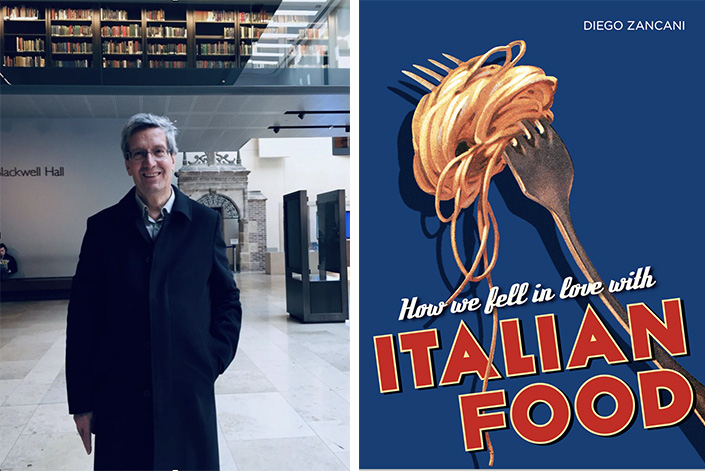
Sunday 22 March, 2026
7pm (London)
Defying Hitler: The White Rose Pamphlets
GUEST SPEAKER: Dr Alexandra Lloyd
Is it not so that in the present day, every honourable German is ashamed of their government? And who amongst us can foresee the extent of the infamy that will be on us, and on our children, when the veil is one day lifted from our eyes and the most horrific crimes, crimes beyond all measure, come to light? (First Pamphlet of the White Rose)
The White Rose (die Weiße Rose) resistance circle was a group of students and a professor at the University of Munich who in the early 1940s secretly wrote and distributed anti-Nazi pamphlets. At its heart were Hans Scholl, Sophie Scholl, Christoph Probst, Alexander Schmorell, Willi Graf and Professor Kurt Huber, all of whom were executed in 1943 by the Nazi regime. The youngest among them was just twenty-one years old.
‘Long Live Freedom!’ - Hans Scholl’s last words before his execution.
Join Dr Alexandra Lloyd author of Defying Hitler: The White Rose Pamphlets (2022), as she outlines the story of the group and their resistance texts. Dr Lloyd is a lecturer in German at the University of Oxford and a Fellow by Special Election in German at St Edmund Hall. She has been part of the team which runs the Oxford German Network an initiative of the German department of the Faculty of Medieval and Modern Languages dedicated to cross-cultural cooperation between schools, cultural organisations, businesses, and policy-makers.
£10 for individual talk
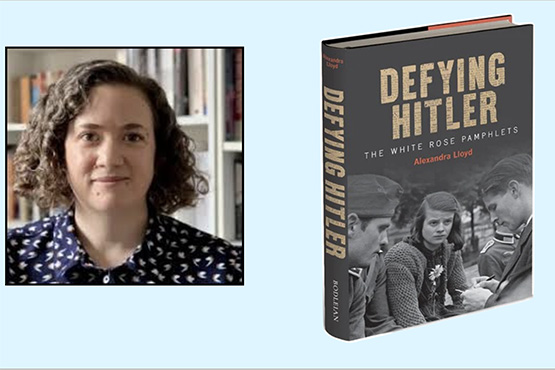
Sunday 12 April, 2026
7pm (London)
The Fascinating History of Cumberland Lodge
SPEAKER: Melanie King
Cumberland Lodge is a remarkable place where history, ideas, and social purpose intersect. Founded in 1947 as an educational charity, the Lodge was the brainchild of Amy Buller, whose groundbreaking work Darkness Over Germany explored how young people could be swayed by destructive ideologies. Determined to create a space for open dialogue and moral learning, she established Cumberland Lodge within a building whose own history is rich and colourful.
Originally commissioned in the 17th century, the Lodge later became closely associated with Sarah Churchill, the influential and charismatic Duchess of Marlborough, and subsequently with William Augustus – better known as ‘Butcher Cumberland’- whose controversial legacy still sparks debate today.
Today, Cumberland Lodge carries forward Buller’s vision by bringing together students, thinkers, and leaders to tackle some of the most pressing social and ethical issues of our time. It stands as a unique setting where history inspires honest conversation and where education is used as a tool for building a more just, inclusive society.
Join social historian Melanie King as she shares the colourful life of Cumberland Lodge.
£10 for individual talk
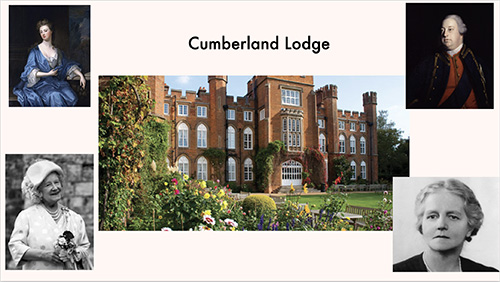
Sunday 26 April, 2026
7pm (London)
HOAX: Here lies Fanny Lynes, whose whispers from beyond the grave spark a London scandal
GUEST SPEAKER: Dr Madeleine Pelling
Here swings Mary Bateman – seamstress, prophetess, murderer.
Here stands Mary Willcocks. Or is it Anne Burgess? Or perhaps Princess Caraboo from the distant island of Javasu?
A ghost. A witch. A princess. Three transgressive women, fighting for their lives in the shadows of the Enlightenment.
As empires expanded and discoveries emerged from laboratories and libraries, science and superstition, reason and rumour collided. The question of who was – and was not – to be believed grew ever more fraught. Out of the chaos, these women rose as symbols of terror and fascination. But were their lies really their own?
In this engrossing lecture, Madeleine Pelling uncovers a veiled world of moral panic, tall tales, and true crime. Exploring culpability and complicity, she reveals how the great age of the hoax continues to hold up a mirror to our own turbulent relationship with truth.
Dr Madeleine Pelling is a cultural historian and broadcaster. Her debut, Writing on the Wall: Graffiti and the Rebellion in Eighteenth-Century Britain (Profile, 2024), was named a Book of the Year by BBC History, History Today and The Sunday Times, while her second, Hoax (Profile, 2026), explores the Enlightenment’s obsession with lies, fraud and performative truth. Madeleine is a rising presence on screen and in audio, co-hosting the hit BBC-acquired podcast After Dark (over 12 million downloads), and fronting historical documentaries for History Hit, Sky, and Channel 4.
Nominated as Best New Presenter at the 2024 Audio & Radio Industry Awards, Madeleine also holds a PhD from the University of York and is an elected Fellow of the Royal Historical Society.
£10 for individual talk

